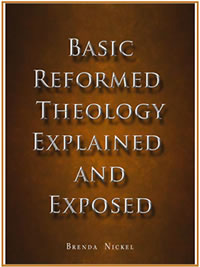The Withering Flower – The Fad of TULIP Theology 2
 Are You a Calvinist or a Confused Arminian?
Are You a Calvinist or a Confused Arminian?
The Problem of the 1,2,3, and 4 Pointers
Let me address this by allowing Calvinists to answer this question. While reformed theology is gaining popularity, it is also causing quite a bit of confusion. Because most “Christians” do not accept all points of this theology, they do try to compromise by saying they believe in some of them. Most will say that they are two or three or four point Calvinists. The question is, can this be true?
As one website puts it:
“A tulip is a flower with intertwining petals, and without which, it would not make up a complete flower. If one petal is removed from the flower, it ceases, for all intents and purposes, to be complete. It is the same with the essential doctrines of salvation. Each doctrine is essentially linked to the others. If one of them is removed, then the whole system falls into absurdity and contradiction. (Thus, there would be no such thing as a 3 point Calvinist or a 4 point Calvinist (like Amyraldianism)–it would be better to say they are confused Arminians.)” http://www.apuritansmind.com/TULIP/TULIP.htm
Calvinist Edwin Palmer states:
“This is strictly a Reformed doctrine and hangs or falls together with the other four points that we have been discussing. There are, however, Christians today who hold to the perseverance of the saints while at the same time rejecting the other four points. We believe, however, and will try to show later on, that this is an inconsistency in their thinking.” (The Five Points of Calvinism, Moelker Printing Co. [Grand Rapids, Michigan], 1954 ed, p. 59.)
Calvinist Dr. Matthew McMahon states:
“The TULIP doctrine of Calvinism is not a comprehensive look at the doctrine. Calvinism is often seen as the five-point doctrine but this is a common misconception. Calvinism is hundreds of points which come together in a unified whole. TULIP is only a very brief, basic, look at Calvinism and an easy way to remember it. Sometimes people will say they are a three point Calvinist or a four point Calvinist, but this cannot be so. Calvinism as a whole cannot be broken down into separate parts just because that person doesn’t feel that he\she cannot cope with a certain perspective. Three and four point Calvinists are simply confused Arminians.” (A Short history of Calvinism, the Reformation, and England by Dr. C. Matthew McMahon)
Taken from the website Reformed Theology.com
There are No Four-Point Calvinists
“Within the Dispensational theological camp there are quite a number of so-called four-point Calvinists. This means that while they fully embrace most Calvinistic soteriology, such as the biblical doctrine of irresistible grace, yet they believe Christ died with the same universal intent for all humanity. To put it another way, unlike traditional full-orbed Calvinists, they do not believe Christ died (redemptively) for the elect only. With the notable exception of the MacArthur Dispensationalists who are five point Calvinists, most others in that camp (such as those influenced by Dallas Seminary) reject the doctrine of limited atonement. Well… what I would like to demonstrate today is that rather than giving reasons why they are wrong, I am more inclined simply to call them inconsistent, for I believe it can be easily demonstrated that most of them already believe in limited atonement without consciously knowing that they do.” http://www.reformationtheology.com/2006/03/there_are_no_fourpoint_calvini_1.php
As you can see, Calvinists themselves will tell those of you who do not hold to all 5 points that you are confused Arminians. I would suggest, to those who don’t know already, to study thoroughly these doctrines and see if they line up with the Scriptures.







if all the points are intertwined and are needed for each other to be true would it not then be true that if you can show that one of the doctrines is true then the other four must also be true?